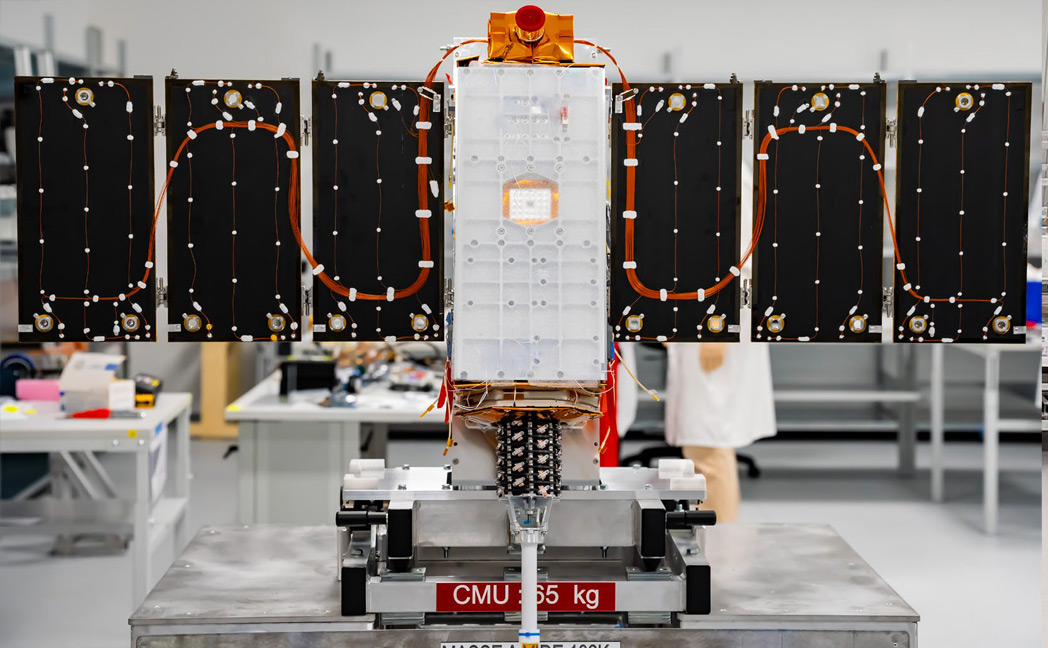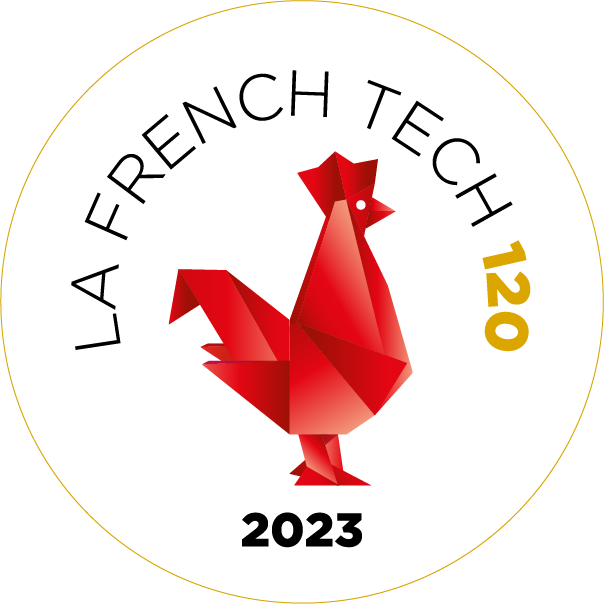Kinéis's nanosatellite industrialization
Press release • March, 8th 2024
DEPLOYEMENT OF THE KINEIS 2024 CONSTELLATION
Kinéis's nanosatellite industrialization revolutionizes.
the new French space ecosystem
In 2024, Kinéis, satellite operator and connectivity provider for the Internet of Things (IoT), will deploy the 1st European constellation dedicated to the IoT. The constellation's 25 nanosatellites will be launched from New Zealand in 5 launches, starting in June 2024. Only four years after its historic 100 million euro fund-raising, Kinéis has entered the industrialization phase for its nanosatellites. For this first in the French space industry, Hemeria has set up a unique mass-production facility to integrate and manufacture the 25 nanosatellites.
On the occasion of this industrialization phase, Alexandre Tisserant, President of Kinéis, declared:
"The mass production of the 25 nanosatellites of the Kinéis constellation represents a significant step in the realization of our project and is not only a milestone in the history of the French space industry but also an important milestone in the new business model of this evolving ecosystem, symbolized by the close ties between public authorities and the industry."

A CONCENTRATE OF INNOVATIVE TECHNOLOGY
Thanks to the miniaturization of electronic components, Kinéis’s nanosatellites illustrate the technological prowess of the French space industry, guaranteeing flight and mission performance as good as that of a conventional satellite.
This miniaturization has allowed for cost-efficient and optimized production times for the nanosatellites. Nowadays, it is now possible to manufacture ten nanosatellites for the price of one regular satellite. The Kinéis system was made possible thanks to the concept of combining cost-efficiency and productivity, revolutionizing satellite IoT:
Connect to any object worldwide and transmit data to the end user in near real-time, at low bit rates (small messages), with very low energy consumption, thanks to the constellation of 25 nanosatellites and its network of 20 ground stations.
The advantage of Kinéis's constellation of nanosatellites (unlike some existing satellite constellations) is that it minimizes its spatial footprint, in addition to being low in orbit (650km).

A technological gem that only weighs 28kg

Before industrialization, Hemeria and Kinéis produced the first reference satellite, the Proto-Flight-Model, to enable technical qualification through numerous mechanical, environmental, and performance tests. Satellite operability tests were also carried out with the Kinéis ground segment (ground stations), including the Kinéis Nanosatellite Control Center, located at the CNES Toulouse Space Center. This essential qualification phase enabled the production of the other 24 satellites in the constellation to begin.

Kinéis and Hemeria teams behind the Proto-Flight Model undergoing electromagnetic testing, at Astrolab in Toulouse.
Applications in response to the challenges of the 21st century:
Kinéis operates for a global market in fields that represent major challenges for human activities and their environment: agriculture, natural hazard prevention (forest fire detection, flooding, drought, pollution), traceability of wild and farmed animals, monitoring of energy infrastructures and networks (leak detection and surveillance), transport and logistics monitoring, monitoring of commercial and scientific maritime activities, security (search and rescue) and defence.
AN UNPRECEDENTED PRODUCTION MODEL FOR THE NEW SPACE SECTOR
The time required to produce one satellite can varies according to it’s complexity, it’s height and the level of technology used.
In general, the design and construction of a satellite the size of a large car can take from a few months to several years.
Thanks to its partners and flagships in the French space industry (Hemeria, Syrlinks, Thales Alenia Space), Kinéis has successfully orchestrated the production of its 25 nanosatellites in just 6/7 months. Hemeria, at the forefront of production, produces one satellite every 9 weeks.
This 250 m2 clean room, fully equipped to meet the needs of the project, is organized around 6 stations where nanosatellites take shape and are tested at the end of each stage. In the event of an anomaly, a nanosatellite is taken out of the circuit and transferred to the "hospital station", where technical support is provided to rectify the anomaly while maintaining the fluidity of the production chain.
About the industrialization of Kinéis’s nanosatellites, Nicolas Multant, CEO of Hemeria, announced:
“The mass production of 25 complex and reliable smallsats, was an unprecedented challenge for the new French space ecosystem. It took over a year to precisely define all the industrialization phases in order to implement two parallel production lines. Eight satellites exist at different stages of integration, making up a production flow of five satellites per month! Therefore HEMERIA is perked with a functional and durable assembly line, putting us in the best possible position to meet the challenges of future constellations.”
FROM THE ANGELS DEMONSTRATION TO KINEIS’S COMMERCIAL SATELLITES: A SUCCESSFUL TRIAL.
The realization of Kinéis’s nanosatellites would have never been possible without the demonstrator ANGELS, the first industrial French nanosatellite, designed by Hermeria, Thales Alenia Space and Syrlinks (Safran group), in collaboration with the National Centre for Space Studies (CNES). Launched in 2019 with an Argos payload, ANGELS strengths, reliability, lifetime, operability and capacity for spatial data collection fully meet Kinéis's performance expectations for the IoT. The Toulouse-based company drew on the pilot experience of ANGELS and its partners to build its constellation. True to its commitments, CNES is once again demonstrating its support for the development of a new industrial sector by making a major contribution to its inclusion in the New Space.
100% FRENCH FUNDING
Kinéis would not have been possible without the unfailing support of the public authorities, particularly that of the French government, through the CNES, who are implicated financially and technically throughout the project, particularly with the hosting of the Control center of the constellation at the Toulouse Space Center to ensure the positioning of the 25 nanosatellites in conjunction with the Kinéis teams.
The industrialization of the constellation is also the result of 100% French funding, particularly thanks to the support of Bpifrance, CLS (Collecte Localisation Satellite), and CNES. Bpifrance is a public investment bank whose mission is to finance and develop businesses. They encourage support and finance start-ups and tech companies' innovations in favor of tomorrow's industry, especially within the framework of France 2030. Since 2021, Bpifrance has deployed the sum of 25 billion euros for the industrial sector, equivalent to around 50% of all resources injected by the bank into the economy. This historic and massive action continues to build the industry and France of tomorrow.
Caroline Laurent, Director of Orbital Systems and Applications at CNED, said on this occasion:
“ANGELS”, followed by Kinéis, are pioneering missions aimed at building constellations of nanosatellites. These will meet the needs of a new generation of space missions, complementary to traditional programs. This is an important and emblematic step for CNES in the world of New Space and new modes of intervention."
Ressources Kinéis
- What is a satellite constellation?
- Forest fires detection
- Kinéis connectivity: an innovative solution for water resource management
- Video of the TVAC tests of the Kinéis flight model satellite at Thales Alenia Space
- Video of vibration tests at Mecano ID
- Our page dedicated to launches
- Our monthly newsletter Constell’Actions
MORE PRESS RELEASE
contact
Sébastien Martignac
smartignac@kineis.com
07 88 22 67 60
Anne-Cécile Thibault
athibault@kineis.com
06 80 52 45 69
SHARE THIS PAGE :


About us
Created in 2018, Kinéis is a satellite IoT operator.
© kineis - IoT everywhere - 2023
Contact us
Adress
11, rue Hermès
31520 Ramonville-Saint-Agne
France
Phone
+ 33 5 61 39 47 00
Links
FAQ
Press
Newsletter
News
Privacy Policy
Cookie policy
Let's stay connected

